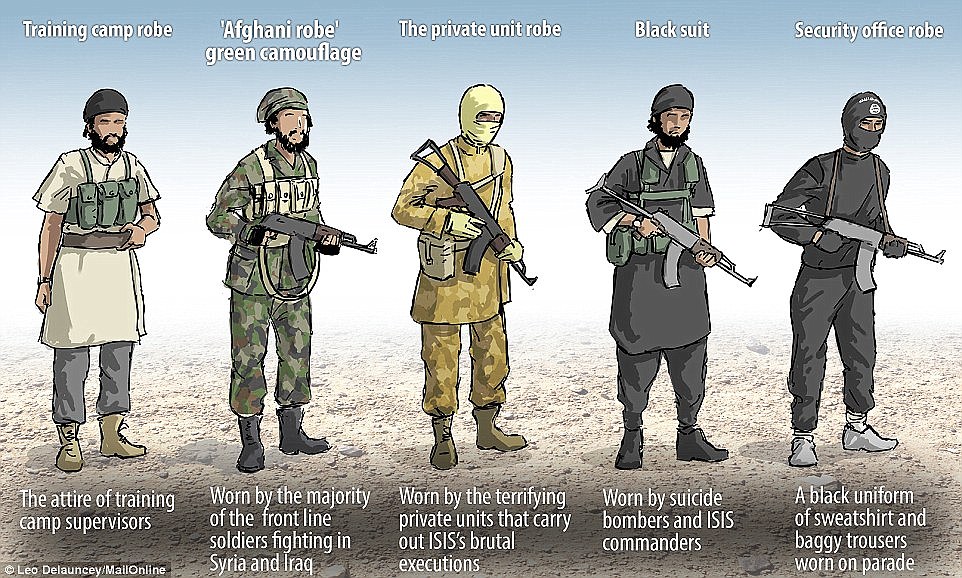ISIS-ove tvornice i robovi u Turskoj
Page 1 of 1
 ISIS-ove tvornice i robovi u Turskoj
ISIS-ove tvornice i robovi u Turskoj
http://www.dailymail.co.uk/news/article-3597143/Child-slaves-making-uniforms-Isis-Inside-Turkish-sweatshop-children-young-nine-work-12-hours-day-stitching-combat-gear-used-battle-Islamic-State.html?ito=social-twitter_mailonline#ixzz4AoaFUXJf

Kermit-

Posts : 26479
2014-04-17
 Re: ISIS-ove tvornice i robovi u Turskoj
Re: ISIS-ove tvornice i robovi u Turskoj
EXCLUSIVE - 'Child slaves' making uniforms for Isis: Inside the Turkish sweatshop where children as young as nine work 12 hours a day stitching combat gear used in battle by Islamic State
Drawing slowly on his cheap cigarettes, 35-year-old Abu Zakour is hardened as he describes how he employs children as young as nine to stitch the uniforms that end up on the backs of frontline ISIS fighters.
The Syrian boys - and a couple of girls hidden upstairs - are paid a minimum of 40 Turkish lira (£10) a day to stitch, cut and measure out the camouflage material and help their older colleagues piece together the uniforms that get smuggled across the border to rebel groups.
‘My kids are in a school run by an NGO,’ he said, speaking exclusively to MailOnline from his office in the Turkish border town of Antakya. ‘These children could go too but their parents want them to earn money, so what can I do?’

+23
Child labour: A young boy at work making uniforms in Turkey that apparently find their way to Isis soldiers. ‘The only reason that these children work with me is for the money - If there were no war in Syria, these children would be in school—and school would be a much better option for them,' factory owner Abu Zakour told MailOnline

+23
So young: About ten children are employed making uniforms being smuggled into Syria to sell to Isisi fighters. They should be in school but their parents send them to work

+23
Precision: The children work twelve hours a day sewing, measuring and cutting the camouflage material to make the military uniforms

+23
Boy tailor: The fabric used at the factory is imported from Istanbul where Turkish textile factories replicate US and Russian camouflage depending on demand, although desert US design is a customer favourite and in high demand
Abu Zakour is a simple businessman – not a revolutionary ideologue or an ISIS sympathiser – but he is also seemingly untroubled by the ethics of kitting out ISIS in camouflage, or by hiring children to do it.
His hulking shape and assertive demeanor marks him as a man not to be messed with. He lived under brutal ISIS rule until he managed to escape Raqqa just six months ago.
Originally from Aleppo, the entrepreneur escaped the incessant shelling of the now destroyed city for the relative safety of Raqqa - the de facto Syrian capital of the terror group.
While the city was ruled by fanatics, it provided an escape from the daily bombardment of President Assad's warplanes - until the US-led coalition ramped up bombings on the ISIS nerve centre.
'I had children working with me in Raqqa too. ISIS wanted children going to Shariah schools, but no one sent their children because there was a lot of bombing.
'The first time I was arrested, it was for cigarettes. They found cigarette butts on the floor but just gave me a warning—the second time, they found the ashtray, jailed me three days and gave me 40 lashes. I was arrested a third time, also for smoking...They made a huge problem for people.

+23
Production line:The Syrian boys - and a couple of girls hidden upstairs - are paid a minimum of 40 Turkish lira (£10) a day to stitch, cut and measure out the camouflage material and help their older colleagues piece together the uniforms that get smuggled across the border to rebel groups

+23
Camouflage: Young boys at work in a shop that makes backpacks, uniforms and other military gear for the Syrian market, and often end up in the hands of Isis
'In the end, I took my things, and I left. We fled,' he says from his office in the 'Halep Garaj' covered market in Antakya. Out front his shop boasts mannequins dressed in camouflage and smart glass cabinets displaying 'adventure kit' - torches, binoculars, pocket knives, gloves and webbing.
Lighting another cigarette he reveals his order sheet and shares his logistical woes of stocking the Syrian rebels with military gear - ISIS are far from his only customers.
‘The main problem for the military clothes are the roads—all of the roads in Syria and from Turkey to Syria are closed.
‘Of course we made far more money with the military clothes than the civilian clothes. There is a big difference between the military clothes and the civilian clothes, but what can we do? Where there is work, there is work.’
From his modest factory in Antakya – which finally shut up shop earlier this year after tightened controls put a stop to smuggling his wares through the border - his workers pay strict attention to the differing stylistic demands of the multitudes of rebel groups in northern Syria.

Drawing slowly on his cheap cigarettes, 35-year-old Abu Zakour is hardened as he describes how he employs children as young as nine to stitch the uniforms that end up on the backs of frontline ISIS fighters.
The Syrian boys - and a couple of girls hidden upstairs - are paid a minimum of 40 Turkish lira (£10) a day to stitch, cut and measure out the camouflage material and help their older colleagues piece together the uniforms that get smuggled across the border to rebel groups.
‘My kids are in a school run by an NGO,’ he said, speaking exclusively to MailOnline from his office in the Turkish border town of Antakya. ‘These children could go too but their parents want them to earn money, so what can I do?’

+23
Child labour: A young boy at work making uniforms in Turkey that apparently find their way to Isis soldiers. ‘The only reason that these children work with me is for the money - If there were no war in Syria, these children would be in school—and school would be a much better option for them,' factory owner Abu Zakour told MailOnline

+23
So young: About ten children are employed making uniforms being smuggled into Syria to sell to Isisi fighters. They should be in school but their parents send them to work

+23
Precision: The children work twelve hours a day sewing, measuring and cutting the camouflage material to make the military uniforms

+23
Boy tailor: The fabric used at the factory is imported from Istanbul where Turkish textile factories replicate US and Russian camouflage depending on demand, although desert US design is a customer favourite and in high demand
Abu Zakour is a simple businessman – not a revolutionary ideologue or an ISIS sympathiser – but he is also seemingly untroubled by the ethics of kitting out ISIS in camouflage, or by hiring children to do it.
His hulking shape and assertive demeanor marks him as a man not to be messed with. He lived under brutal ISIS rule until he managed to escape Raqqa just six months ago.
Originally from Aleppo, the entrepreneur escaped the incessant shelling of the now destroyed city for the relative safety of Raqqa - the de facto Syrian capital of the terror group.
While the city was ruled by fanatics, it provided an escape from the daily bombardment of President Assad's warplanes - until the US-led coalition ramped up bombings on the ISIS nerve centre.
'I had children working with me in Raqqa too. ISIS wanted children going to Shariah schools, but no one sent their children because there was a lot of bombing.
'The first time I was arrested, it was for cigarettes. They found cigarette butts on the floor but just gave me a warning—the second time, they found the ashtray, jailed me three days and gave me 40 lashes. I was arrested a third time, also for smoking...They made a huge problem for people.

+23
Production line:The Syrian boys - and a couple of girls hidden upstairs - are paid a minimum of 40 Turkish lira (£10) a day to stitch, cut and measure out the camouflage material and help their older colleagues piece together the uniforms that get smuggled across the border to rebel groups

+23
Camouflage: Young boys at work in a shop that makes backpacks, uniforms and other military gear for the Syrian market, and often end up in the hands of Isis
'In the end, I took my things, and I left. We fled,' he says from his office in the 'Halep Garaj' covered market in Antakya. Out front his shop boasts mannequins dressed in camouflage and smart glass cabinets displaying 'adventure kit' - torches, binoculars, pocket knives, gloves and webbing.
Lighting another cigarette he reveals his order sheet and shares his logistical woes of stocking the Syrian rebels with military gear - ISIS are far from his only customers.
‘The main problem for the military clothes are the roads—all of the roads in Syria and from Turkey to Syria are closed.
‘Of course we made far more money with the military clothes than the civilian clothes. There is a big difference between the military clothes and the civilian clothes, but what can we do? Where there is work, there is work.’
From his modest factory in Antakya – which finally shut up shop earlier this year after tightened controls put a stop to smuggling his wares through the border - his workers pay strict attention to the differing stylistic demands of the multitudes of rebel groups in northern Syria.


Kermit-

Posts : 26479
2014-04-17
 Similar topics
Similar topics» Merkel prvi put otvoreno zaprijetila sankcijama Turskoj zbog zatvorenih njemackih drzavljana u Turskoj
» Bošnjaci ka vječni robovi sultana
» Uvozni robovi ugibaju po hrvatskim cestama
» U pogonu Tesla Motorsa Hrvati rade kao robovi
» Erdogan : Robovi moraju nastaviti provoditi usprkos koronavirusu
» Bošnjaci ka vječni robovi sultana
» Uvozni robovi ugibaju po hrvatskim cestama
» U pogonu Tesla Motorsa Hrvati rade kao robovi
» Erdogan : Robovi moraju nastaviti provoditi usprkos koronavirusu
Page 1 of 1
Permissions in this forum:
You cannot reply to topics in this forum
 Events
Events Latest images
Latest images
 by Kermit 7/6/2016, 17:19
by Kermit 7/6/2016, 17:19
